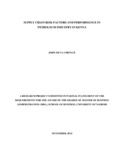| dc.description.abstract | Competitiveness and continuous innovation to maintain it have been the driving force of the dynamism observed in the modern world of business. The petroleum industry is one of the most dynamic sectors with the sector being highly dependent on its supply chain, especially in Kenya where the sector is fully dependent on imports to serve the market, though recent developments indicate that local production is imminent. This study therefore was done with an intention to investigate the supply chain risk factors and their relationship with performance in the petroleum industry. A descriptive survey research design was adopted to meet this objective targeting a population of all the petroleum firms licensed by the Ministry of Energy and Petroleum to import petroleum product to Kenya, which are 53, from whom the study adopted a stratified sampling technique to acquire a sample of 47 respondents. Primary data was collected from the target respondents composed of supply chain Managers using questionnaires. Descriptive and inferential statistics were used to analyze the study variables. Various risk factors were found that are considered in the operations of the petroleum industry supply chain that were put into three strata of procurement risk factors, transport risk factors and distribution risk factors. These factors were observed to affect the performance of the supply chain significantly in the sector with consideration of procurement and transportation risks being observed to garner positive impact on supply chain performance while a negative impact was realized for the consideration of distribution risk factors. The study found that mitigation measures are effective in that their consideration by the firms affect the supply chain performance. It was therefore recommended that increased consideration of both transport and procurement risk factors in the supply chain should be encouraged while distribution risk factors should be substituted with positively impacting factors. Application of various risk mitigation measures is also recommended, as they are effective in enhancing supply chain performance. | en_US |

